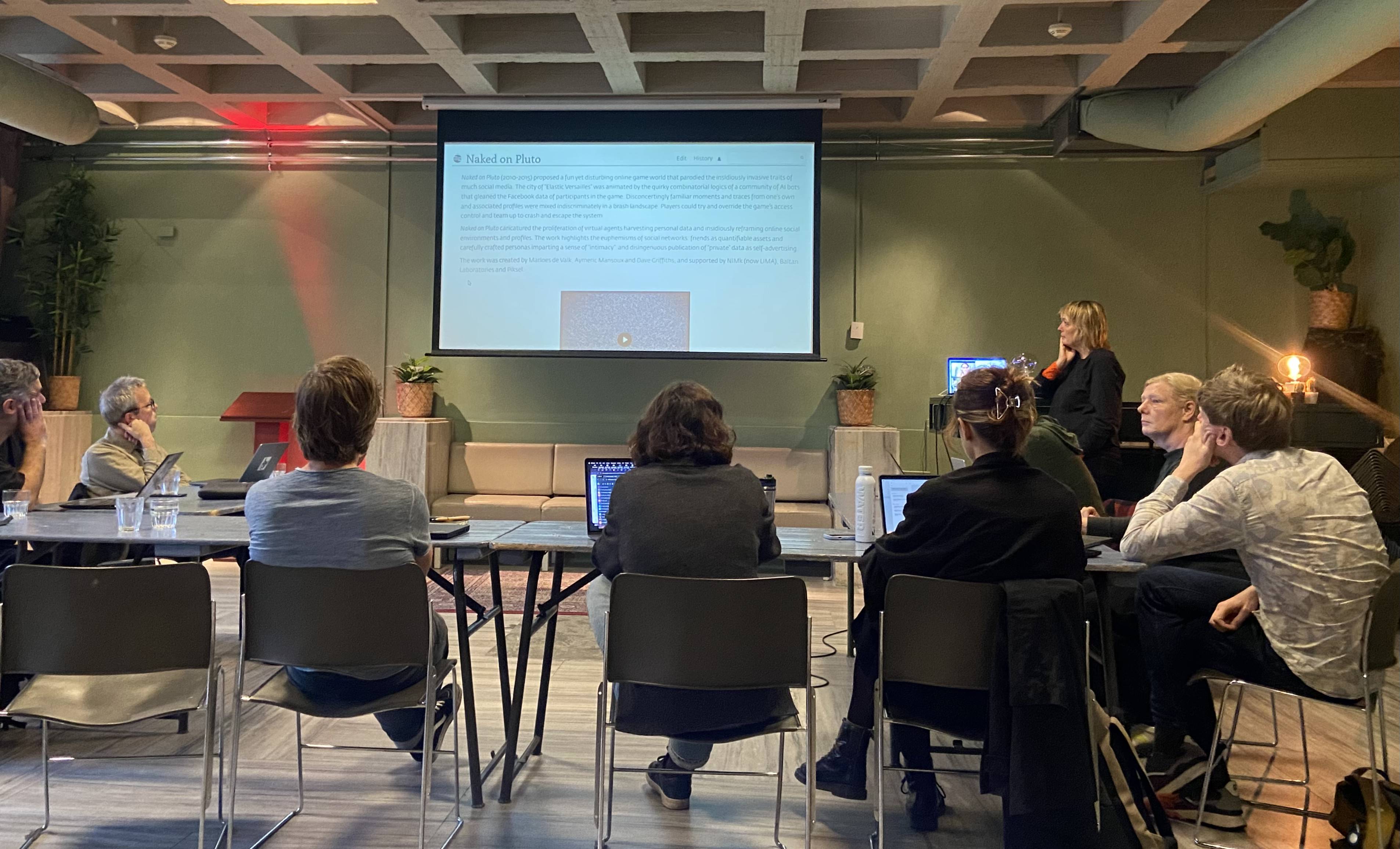
Exploring Media Art Archiving on Wikimedia Projects
How can artists, curators, and small cultural organizations connect with larger open heritage knowledge ecosystems?
In October, an expert workshop took place bringing together experts and practitioners to address the challenges and opportunities of data management and archival practices in the fields of media art and GLAM (Galleries, Libraries, Archives, Museums). Through a series of presentations, collaborative sessions, and discussions, participants examined challenges in data modelling, collaboration, and standardisation, culminating in a blueprint to guide future projects in linked open data.
Exploring Media Art Archiving: Insights from the Wikidata Workshop
Digital art communities, festivals, and individual artists contribute valuable alternative approaches to engaging with digital cultural heritage and commons initiatives. These practices often face challenges when integrating with institutional archives, which prioritise artists and artworks over events or temporary communities of practice. Open ecosystems like Wikimedia projects are known for their robust reference materials, yet emerging cultural practices often struggle to align their innovative methods with standardised systems.
In October, LI-MA hosted a workshop bringing together media art history experts, archivists, researchers, and GLAM professionals. Focused on addressing the challenges and opportunities in documenting complex media art practices, the workshop explored the role of linked open data in cultural production and strategies for preparing metadata to connect with larger archival systems effectively.
Discussions covered key topics such as interoperability, ethical data sharing, and the technical hurdles of adapting archival data for linked open data platforms. Case studies included contributions from institutions like Zentrum für Netzkunst, ZKM Center for Art and Media, Monoskop, Critical Media Lab Basel, the Open Science Lab at TIB Hannover, AvoinGLAM, MEHI, and Pixelache. These examples highlighted innovative strategies for modeling and preserving metadata, balancing granularity with accessibility, and ensuring long-term sustainability.
The workshop emphasised collaborative approaches and provided participants with tools to begin or enhance their own projects. Outcomes included a draft blueprint for starting Wiki-based projects, best practices for data modeling, and guidelines for fostering interoperability across archives.

Challenges in Media Art Archiving
The workshop addressed core challenges in archiving media art, including interoperability, ethical data sharing, and the technical hurdles of adapting archival data to linked open data platforms. Participants debated how to balance granular metadata with accessibility and ensure privacy and data rights in public documentation.
Key discussions focused on how to model events, performances, and conceptual artworks in Wikidata, which often lacks adequate structures for these complex items. Ethical considerations included licensing, privacy concerns, and obtaining consent from individuals represented in archives.
Case Studies
Several projects were presented as case studies, showcasing diverse approaches to archiving and sharing media art:
- Monoskop and Rhizome: Efforts to map data to Wikidata and explore linked open data integration.
- Critical Media Lab Basel: Innovative work on hybrid archives using extended archival descriptions with linked data.
- Finland’s MEHI Project: The development of the Ontology for Media Art (OMA) and multilingual platforms to document media art history.
- FOMU and Rosa Menkman: Investigations into photography archives and vernacular file formats.
These examples offered valuable insights into practical solutions and underscored the significance of cross-institutional collaboration.
Building a Blueprint for Wiki-based Projects
Participants collaborated to draft a blueprint for starting Wiki-based projects. Key themes included:
- Decision-making tools for structuring data.
- Best practices for modeling media art items, balancing detail and general relevance.
- Guidelines for integrating external ontologies and aligning with FAIR principles (Findable, Accessible, Interoperable, Reusable).
The blueprint offers practical guidance for organisations beginning their own data projects, emphasising accessibility and scalability.
Towards a Unified Framework
The workshop addressed several significant obstacles. Among these was the challenge of data modelling, which involves navigating the complexities of media art’s dual nature as both artistic expression and digital data. Technical barriers also emerged as a key issue, with participants highlighting the absence of standardised APIs and reproducible workflows, leading to a reliance on semi-automated tools like OpenRefine. Ontological inconsistencies presented another hurdle, particularly in aligning diverse vocabularies and resolving distinctions between video art and film within data models. Finally, concerns about data rights were discussed, focusing on the ethical implications of making personal or copyrighted information openly accessible.
A proposed data model integrates linked open data with Wikidata while accommodating local collections via Wikibase instances. Collaborative frameworks, such as AvoinGLAM and MEHI, emphasise connecting diverse archives through standardised practices.
The workshop culminated in a draft blueprint, outlining key steps for introducing newcomers to wiki-based tools, standardising data schemas and ontologies for media art, and facilitating global collaboration to scale and automate integration efforts.
This initiative lays the groundwork for more inclusive and accessible media art archives, connecting history with future generations through open knowledge platforms.
Advancing Media Art Preservation
The workshop reflects LI-MA’s commitment to advancing media art preservation through open data innovation. By fostering cross-disciplinary collaboration and addressing complex archival challenges, workshops like this lay the groundwork for more connected, sustainable cultural heritage practices.
Workshop participants: Tereza Havlíková (Zentrum für Netzkunst), Andreas Kohlbecker (ZKM), Dušan Barok (Monoskop), Philipp Messner (Critical Media Lab), Lozana Rossenova (TIB), Susanna Ånäs (AvoinGLAM, MEHI), Andrew Paterson (AvoinGLAM, Pixelache)
Header and thumbnail image: Adinda van Wely







